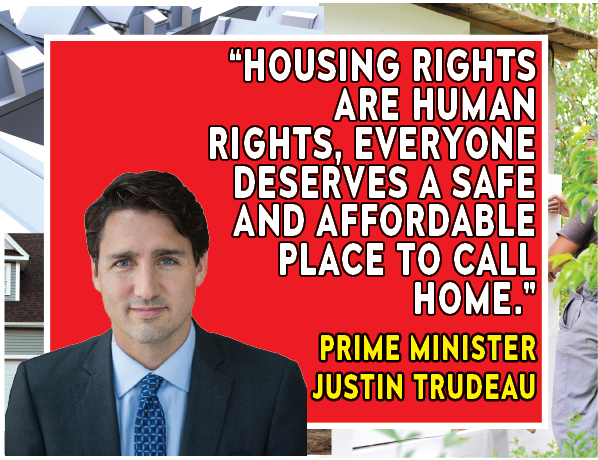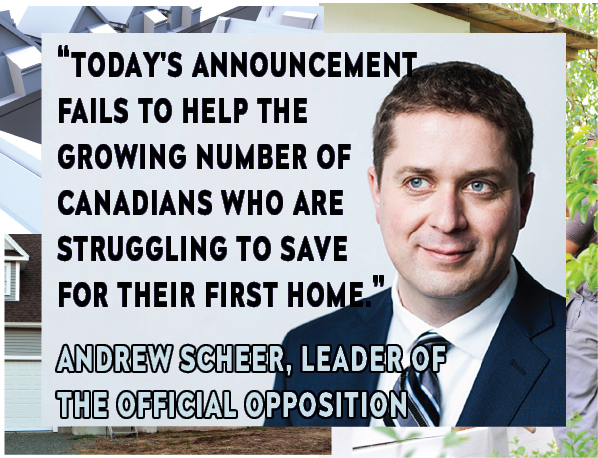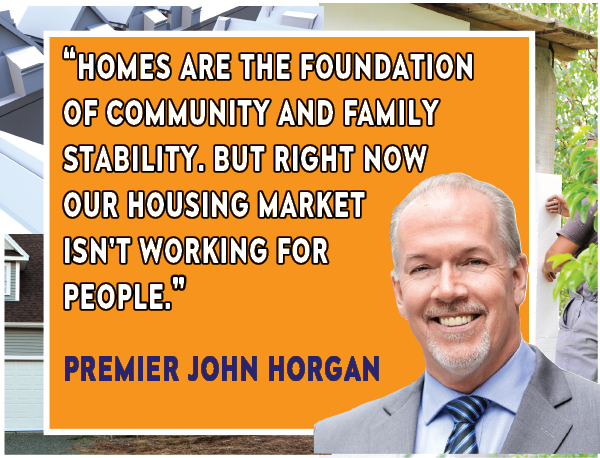| |

 Print
First-ever National Housing Strategy Launched in Canada
11-22-2017
OTTAWA - All Canadians need and deserve housing that is safe and affordable. A home makes Canadians feel more secure, making it easier to raise healthy children, pursue an education, and gain employment.
The 10-year, $40 billion National Housing Strategy that will help reduce homelessness and improve the availability and quality of housing for Canadians in need.
 "[This is a] new, innovative plan that re-establishes the role the federal government must play in housing," Prime Minister Justin Trudeau said in announcing the plan in Toronto. "[This is a] new, innovative plan that re-establishes the role the federal government must play in housing," Prime Minister Justin Trudeau said in announcing the plan in Toronto.
"Housing rights are human rights, everyone deserves a safe and affordable place to call home."
Across Canada, 1.7 million Canadians are in core housing need. To help address this, the Strategy has set bold goals including:
-
reducing chronic homelessness by 50 per cent;
-
removing more than 530,000 households from housing need;
-
creating four times as many new housing units as built under federal programs from 2005 to 2015;
-
repairing three times as many existing housing units as repaired under federal programs from 2005 to 2015; and
-
protecting an additional 385,000 households from losing an affordable place to live.
The National Housing Strategy is meeting the needs of Canadians, including seniors, Indigenous Peoples, survivors of family violence, people with disabilities, refugees, veterans, and those grappling with homelessness. It will promote diverse communities and encourage the construction of homes that are sustainable, accessible, mixed-income, mixed-use, and located near transit, work, and public services. In response to calls from housing advocates, service providers and feminist leaders, the Strategy commits to ensuring that at least 25% of funds go to projects for women, girls and their families.
This Strategy – built by and for Canadians – sets a long-term vision for housing in Canada with unprecedented investments and new programs that will deliver real results for Canadians working hard to improve their quality of life.
This Strategy will focus on the needs of the most vulnerable through a human-rights-based approach to housing. Within the next year, legislation will be introduced obligating the federal government to maintain a National Housing Strategy and report to Parliament on housing targets and outcomes.
The federal government will work with provinces and territories to develop a $4 billion Canada Housing Benefit to be launched in 2020 to respond to local housing needs and priorities. This will be a significant new tool to address challenges of housing affordability in communities across the country. It will provide an estimated average of $2,500 per year to each household recipient, assisting at least 300,000 families when fully implemented. The benefit be delivered directly to households as a portable benefit they can use to help with the costs of housing.
The Honourable Andrew Scheer, Leader of the Official Opposition and Leader of the Conservative Party of Canada, today issued the following statement in response to Prime Minister Justin Trudeau’s announcement of a national housing strategy:

“Conservatives support helping those who are less fortunate. But when Justin Trudeau says he wants to give Canadians a break, I just don't believe him. As many as 60% of lower income Canadians are paying higher taxes under this Liberal Prime Minister. This is a Prime Minister who gives with one hand and takes more with the other.
"Today’s announcement fails to help the growing number of Canadians who are struggling to save for their first home and keep up with Justin Trudeau's tax hikes.
“As a result of Liberal policies, Canadians now pay more for gasoline, home heating, hydro, housing, sports and arts programs for children, personal savings, and much more.
"You simply cannot trust Justin Trudeau when he says he's going to solve a problem. Everything he touches turns into a disaster.
"Canada’s Conservatives understand what the dream of homeownership means to so many people, whether you were born here or have recently arrived to Canada. It represents opportunity, greater control over your future, and a chance to build a better life for your family. The government needs to focus on making home ownership more affordable for Canadians, while at the same time ensuring results for those less fortunate.”
John Horgan- Premier of BC was pleased to hear the announcement from the federal government today on National Housing Day. He stated, “Homes are the foundation of community and family stability. But right now our housing market isn’t working for people.
That is why our September budget update included funding to build more than 1,700 units of affordable housing for families. We are working with local governments throughout B.C. to create 2,000 new units of modular housing to help people get off the street. Currently, we’re on track to open 1,000 new units for the most vulnerable people in the province by summer. ”

Quotes:
“Our Government is establishing a federal leadership role in housing. The National Housing Strategy will create a new generation of housing in Canada. It will promote diverse communities and will build housing that is sustainable, accessible, mixed-income and mixed-use that will be located near transit, work and public services.”- Honourable Jean-Yves Duclos, Minister of Families, Children and Social Development and Minister Responsible for Canada Mortgage and Housing Corporation
“Affordable housing continues to be the number one issue facing residents of Coquitlam – Port Coquitlam and it is certainly the number one issue I raise within our Caucus. Today our government took an important first step in launching the National Housing Strategy. Today’s announcement will significantly improve the number of housing units and help renovate the current housing stock in the Lower Mainland where we are experiencing exorbitant housing prices and lack of access.” – Ron McKinnon, Member of Parliament for Coquitlam – Port Coquitlam.
Our government is taking leadership to ensure affordable housing for Canadians with the first-ever national housing strategy. This plan will support Canadians with the Canada Housing Benefit, promote construction of new homes, and renovation of existing homes that are near transit, work, and public services. Canadians deserve access to affordable housing, and this strategy ensures housing is within reach of Canadians.” Sukh Dhaliwal, MP, Surrey-Newton
Quick facts:
-
The National Housing Strategy – Canada’s first ever – was developed through consultations with Canadians from all walks of life: people who have experienced barriers to good housing, experts, stakeholders, think tanks, as well as provinces and territories and municipalities.
-
Over the next 10 years, the Strategy – which will be in part funded jointly by the federal, provincial, and territorial governments – will help reduce homelessness and the number of families living in housing need, and will help strengthen the middle class.
-
Investment under the National Housing Strategy includes:
-
$15.9-billion for a new National Housing Co-Investment Fund
-
$8.6-billion for a new Canada Community Housing Initiative in partnership with provinces and territories, and $500 million through a new Federal Community Housing Initiative
-
$4-billion for a new Canada Housing Benefit to be launched in 2020 in partnership with provinces and territories
-
$2.2-billion to reduce homelessness
-
$300-million in additional federal funding to address housing needs in Canada’s North.
-
$241-million for research, data and demonstrations.
In recognition of the significant amount of new housing units to be built and repaired through the federal Co-Investment Fund, the Strategy also includes ambitious targets to reduce greenhouse gas emissions, and ensure accessibility in building design.
The Government of Canada is also working with Indigenous leaders to co-develop distinctions-based housing strategies with First Nations, Inuit, and Métis Nation that will be founded on the principles of self-determination, reconciliation, respect, and cooperation.
Footnotes:
|